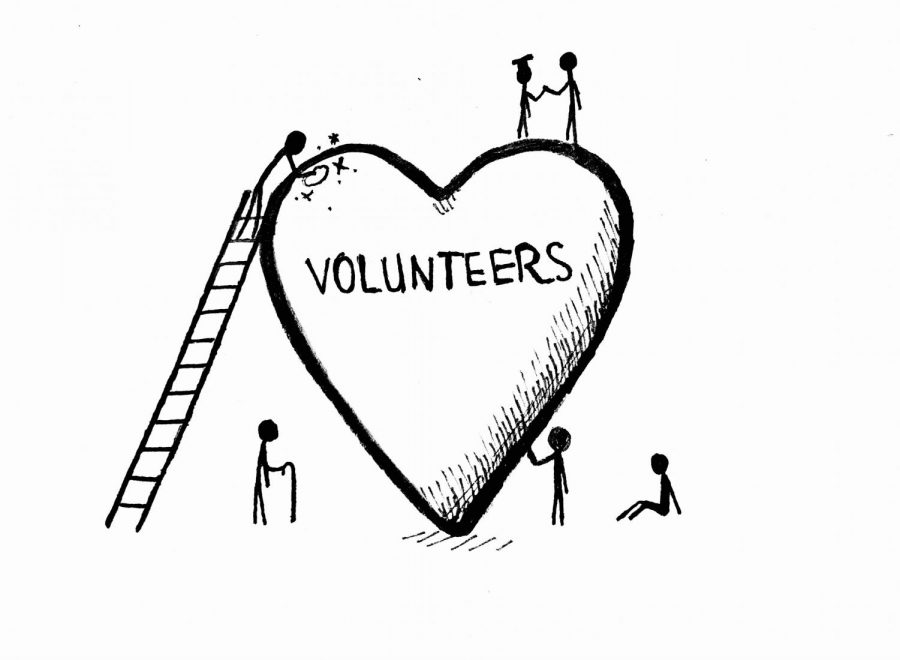Why would someone be offering to do work for free?
Millions of people do just that.
Although some people believe volunteering is unnecessary or pointless because it does not seem to provide an apparent personal gain, the value amounts to more than setting aside time to do unpaid labor for an assignment or because of the advice to “get involved.”
According to the findings of the 2018 Volunteering in America Report, 77.34 million adults (30.3% of the country’s population aged 18 and up) volunteered through an organization. Altogether, Americans volunteered nearly 6.9 billion hours, worth an estimated $167 billion in economic value. Additionally, on Earth Day of last year, more than 500,000 volunteered in the US and Canada to clean up their communities and environment.
By now, volunteers will have done millions of more hours of work for the good of their communities. But even though volunteering can make such a vast impact, it does not seem fun enough to be appealing to some people.
The motivation to volunteer instead develops through a desire to prepare for the future, increase skills and knowledge, attain valuable work experience, and give back to society, and such is the case for Andrew Ghazouli, a frequent volunteer and junior at Carlmont High School.
“I’m part of an organization called Dream Volunteers. I volunteer because I think it’s super important to give back to the community,” Ghazouli said. “Being pretty privileged myself, I think taking a few hours out of my day every now and then or even organizing my own volunteering event is the last I could do to give back and help those that haven’t been afforded the same opportunities I’ve been given.”
According to an article by Stanford Longevity Center’s Amy Youtopolous, students often do not have enough information to know where to look for volunteer opportunities and instead turn to sports and clubs, more standard options with more obvious goals. Consequently, this causes volunteering to be slightly less prevalent among adults and students alike.
Other common reasons people do not turn to volunteering are that they may not have time to set aside to do so, do not have information about where to volunteer, or cannot immediately identify a reason they should.
One of the best reasons to be a volunteer is to include work experience in an application.
“When they are assessing a student’s application, most colleges, specifically those that are using a more holistic approach towards admissions eligibility, take into consideration extracurricular activities and any other activities outside of academics in the classroom. They really want to see what type of personal characteristics you have and possess as a student. And so when it comes to volunteering or doing any community service that really shows them that you are invested in your community and not done things beyond just academics or maybe athletics,” high school counselor Matthew Ledesma said.
Being a well-rounded student is very valuable, according to Ledesma. For example, a student could have a 4.6-grade point average but never have gotten involved in their community through volunteering. Because every college and employer farther down the line seeks applicants who balance their time between multiple areas of growth, volunteering involvement can be crucial to an individual’s future.
“I think volunteering will definitely also help with getting into college and getting a job. Although I’m not doing it for those reasons, I think they definitely view people who are more active in their community and who help others more fondly than those who don’t,” Ghazouli said. “It also ties into the benefits of volunteering because they may see someone who has led volunteering events as having more leadership experience.”
Because volunteering always involves a service task, such as clearing up litter, supervision at a summer camp, or food preparation, such tasks offer the chance to obtain essential life skills.
“Volunteering has helped me develop my leadership and communication skills,” Ghazouli said. “Having to plan an event, which is what I do, means you have to communicate with many people and guide them through the event so that it runs smoothly. Sometimes participating in volunteering efforts can also help you step out of your comfort zone a little and grow as a person if it’s a new experience for you, like teaching younger kids or something similar.”
According to Western Connecticut State University, many volunteering opportunities provide extensive training. For example, one could become an experienced crisis counselor while volunteering for a shelter or a knowledgeable art historian while donating your time as a museum docent.
While these instances do not immediately seem as though they provide enough for a person’s career development, they require leadership, responsibility, and a strong work ethic to some degree and the more specific skills necessary for that particular service. Additionally, being a volunteer for multiple hours over a long period shows consistency and persistence to develop job skills.
“Much rather than just having numbers, a lot of hours, it’s about the quality of those elements and what you really are learning from them,” Ledesma said. “Getting a head start on gaining the capability to be a good worker is something you’ll always need in the long run.”
The ways volunteering is beneficial do not stop there.
Researchers for the National Center for Biotechnology Information found the other non-academic benefit of volunteering; it supports mental and physical health, life satisfaction, social well-being, and depression. This study found that volunteering participation resulted in an average 8.54% increase in mental health, 9.08% in physical health, 7.35% in life satisfaction, 11.11% in social well-being, and a 4.30% decrease in depression. Overall, volunteers gave answers that they felt the most healthy in all of these ways on a five-point scale.
The study only assessed the participants’ opinions on their health. Several other studies, though, such as one conducted by the American Journal of Preventive Medicine, found that volunteering did decrease the risk of mortality and physical declination in older adults. It also confirmed that volunteering lowered feelings of depression. Essentially, in order to improve health, volunteering is the path to that goal, especially if it is done throughout a person’s life.
The Greek philosopher Aristotle’s view on life’s essence was to “serve others and do good.” Volunteers perfectly accomplish this by doing good for themselves, others, and the general public.
“I know that I’ve grown as a person and gained a lot from the experiences I’ve had while volunteering,” Ghazouli said. “I couldn’t possibly think of a reason why someone shouldn’t volunteer; it is such a good way to give positivity to the world.”























